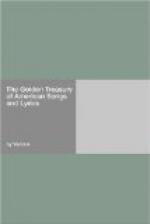Had Willis written more such lyrics as “Unseen Spirits,” his fame could hardly have proved so ephemeral. Poe considered this poem Willis’s best, and I see no ground for calling the critic’s judgment in question.
To Helen.—This brief lyric, written in the poet’s youth, is not only among the most exquisite from his pen, but it furnishes one of the most famous among current quotations:
“The glory that was Greece,
And the grandeur that was Rome.”
On the Death of Joseph Rodman Drake.—These manly lines have yielded another phrase to the world’s memory. Hardly any quotation is more hackneyed than the last two verses of the first stanza. Drake was a young poet, the intimate friend and literary co-laborer of Halleck, who died September, 1820, in his twenty-fifth year.
To the Fringed Gentian.—This lyric well illustrates what Mr. Stedman has aptly termed Bryant’s “Doric simplicity.” Nothing of Wordsworth’s is freer from ornament or from the least trace of affectation.
The Raven.—Though not belonging to the highest order of poetry, “The Raven” still maintains its position at the head of its class. No more astonishing tour de force can be found in English literature.
Nature.—Generally regarded, I think, the finest of Longfellow’s, if not of American, sonnets.
Ichabod.—Occasioned by the defection and fall of Daniel Webster. It is worthy a place by the side of Browning’s “Lost Leader.” In later years, Whittier wrote a poem on the theme, which, while not a retraction of his former position, is penned in a tenderer, more tolerant mood, “The Lost Occasion” is its title, and it is only just to the poet to read this second lyric, hardly less successful, in connection with the first.
Old Ironsides.—“Old Ironsides” was the popular name for the frigate Constitution. Dr. Holmes’s poem appeared in the Boston Advertiser “at the time when it was proposed to break up the old ship as unfit for service.”
Bedouin Song.—One of the most spirited, most genuinely lyrical of American poems.
Skipper Ireson’s Ride.—These lines have an easy, swinging quality that is quite inimitable. One inclines to agree with Mr. Stedman: “Of all our poets he (Whittier) is the most natural balladist.”
The Village Blacksmith.—The directness and homely strength of “The Village Blacksmith” have made it deservedly popular. One questions whether the last stanza might not have been omitted with advantage both to the unity and force of the poem.
The Last Leaf.—This masterpiece of mingled humor and pathos was a favorite poem of Abraham Lincoln.
The Old Kentucky Home.—The sincere and tender sentiment of this song, no less than its popular melody, has made it for many years a favorite. Even better known is Foster’s “Old Folks at Home,” which is said to have had a larger sale than any other American song.




